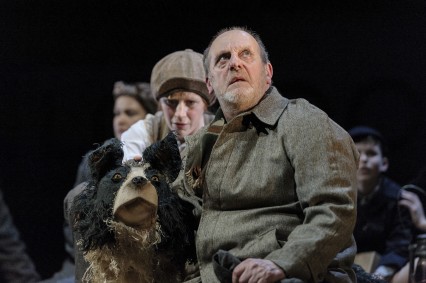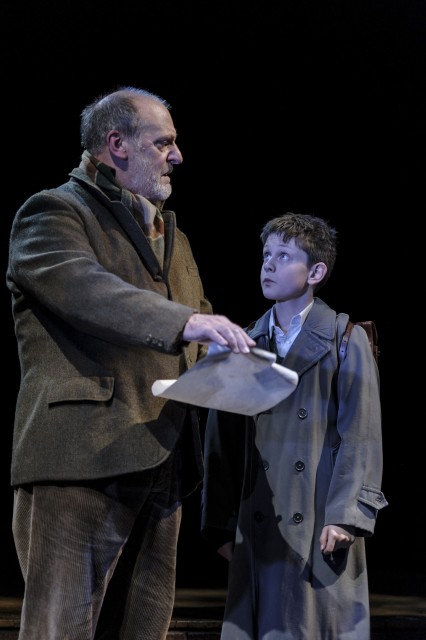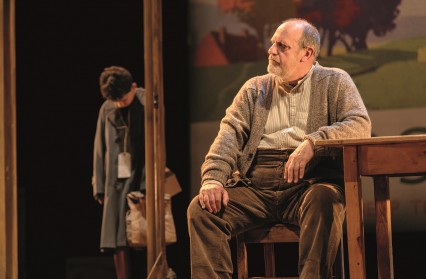Emily Garside talks to actor David Troughton as his highly popular stage version of Goodnight, Mr Tom comes to Cardiff’s New Theatre.
Speaking to David Troughton about Goodnight, Mr Tom his enthusiasm for this classic story is clear. 150 performances in, following two months in the West End and midway through a 13-week national tour, Troughton is as enthusiastic as ever following another successful matinee filled with school children. Describing the journey so far he says, ‘Many a laugh, song and tears’, and that audiences across the country are responding in the same way to this universal story.

We start by talking about the novel: I read it to my children,’ Troughton exclaims. A theme that continues through our conversation is that Mr Tom hits on ‘something that everyone can identify with’. And so for Troughton doing this version of Goodnight, Mr Tom was both ‘coming to it fresh as an actor but also feeling very much a part of its history’. The parallels of both this story, and the history in which it’s embedded being something so familiar to so many, but also a fresh encounter experiencing it live comes up often with Troughton; he’s aware many are encountering it for the first time, while others have a nostalgia for either Michelle Magorian’s novel or for the historical period itself.
Coming to perform it following in the footsteps of not only the literary version but also previous performances, most recently staged by Oliver Ford Davies, and the iconic film version starring John Thaw, Troughton was undeterred, and didn’t watch or really consider the previous incarnations. ‘It’s much like when we do Shakespeare,’ he notes, ‘And people say, “Oh you are following so-in-so.” No, I’m doing it and it’s my version’. It was a process of ‘discovery, finding my own version of the story’.
The play presents its own challenges: the cast is made up of 3 sets of children playing the roles of Zach and William. Troughton notes that this is ‘tricky, because you have to get used every time to their own idiosyncrasies and adjust your part accordingly’ but that it’s always an interesting challenge, meaning that the rest of the cast is forever ‘on their toes’. He also notes what a wonderful experience it is for both the children on stage and in the audience. For the young actors themselves it is ‘a big part and a lot of responsibility’ for the young boys. It is, however, a lot of fun. ‘One of our young cast, when he heard we were going to Glasgow was so excited – he said, “But I’ve never been out of this country before.” It’s an adventure for them, their first time staying in hotels and being away from home.’ But it seems they’ve risen to the challenge on stage and off, carrying the responsibility of their role well. For Troughton it’s also important for the young audiences too, for whom he says, ‘It’s really significant for them to look up on stage and see people their own age performing, and telling the story.’

Thinking of the children in the audience, and the matinee he’s just performed I ask about the younger generation’s response to the play. Immediately he says ‘They’re quiet! We’ve just done a school’s matinee filled with school children, and beforehand you hear all the noise and think, oh god, and wonder what they’ll be like. But then you start and they’re so quiet. Because they’re listening and so engaged with the story, they want to know what is going to happen.’
I ask also does he think about how the young audiences will respond to the darker elements of the book. ‘I love it, but it’s a very dark book. We start off happy and in the countryside and by the second half it’s all darkness in many ways. The atmosphere changes dramatically to darkness.’ He is however reassured by the fact that it ‘all comes right in the end.’
And the younger audiences aren’t the only ones enchanted by the story.‘Older audiences are certainly nostalgic for the time the story is set.’ And they comment in particular on the inclusion of the speeches from Churchill and Chamberlain. It is tapping into, Troughton reflects, the fact that ‘we all have those moments we always remember where we were – for me it’s when Kennedy was assassinated, but we get people who remember those speeches.’
In a broader, cheerier sense the piece also taps into the memories of happy times, and Troughton notes that ‘we use music from the time and songs which people love to hear’ provoking moments of nostalgia among the older generation. And a balance of contrast in what is at times a dark story.
We return then to the darkness of the book when considering the enduring success. Troughton comments that he loves how quickly ‘that atmosphere changes’ and senses it’s ‘strong storytelling as a tool for talking about that time.’
‘It’s so well written, and it taps into the emotions of us all. It feels Dickensian, in style and in themes.’ Drawing on that, Troughton reflects on how relevant the themes still are today, he says, ‘It remains very of the moment, with the themes of child abuse – we know we still have that and it hasn’t gone away.’
It is clear from our conversation how much Troughton is enjoying sharing Goodnight, Mr Tom with audiences around the country. As an actor, for him the power of the tale is in the writing, and David Wood’s adaptation of Magorian’s novel is clearly serving them well. I leave Troughton to take on the evening crowd: ‘A different dynamic,’ he explains, to the earlier schoolchildren, ‘but still just as engaged.’ And although he confides he’s looking forward to working closer to home in his next role (Gloucester in Lear at the RSC) where he can ‘sit in his own chair’ at night, it’s clear also that this Mr Tom is relishing the opportunity to engage with audiences young and old.
10 – 14 May 2016
New Theatre
http://www.newtheatrecardiff.co.uk/what’s-on/goodnight-mister-tom/












